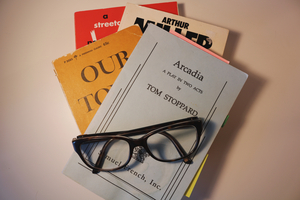BWW Blog: Learning to Love Plays

Like most small-town theatre lovers entering college, the extent of my theatrical experience was the annual school musical and a smattering of community theatre productions. There was no Drama Department or even drama club at school-just a music department spread thin and a budget to pull off one school board-approved, family-friendly, (preferably Golden Age) musical a year. We read Romeo and Juliet and Julius Caesar to varying levels of success in English class, but generally stuck to tried- and-true short stories and novels. Plays seemed like the boring older brother of the musical; they were a stuffy old pitstop on the way to the humor and spectacle of Broadway. I scoffed at plays despite being a writer, not knowing how wrong I was. When I got to college, it was like a completely different world. There was an actual theatre department-and along with it, an entire theatre season full of plays. I had never worked on anything other than a musical, and I was filled with a sense of foreboding. What would I do without the whimsy and energy of musicals? Could I make it without the mad dash to get the actors changed and the set flipped while the music swelled? What if-heaven forbid-I was bored? Some part of me thought that working on plays spelled doom for my love of theatre.
This all came to a head for me in the spring semester when I took a class all about reading and analyzing plays. I was forced to use my brain in new ways-not just to regurgitate lectures on a test but rather to think critically about intention and meaning and the careful construction of a piece. Plays became a vehicle for broadening my horizons. My conversion to play lover was complete after we read Tom Stoppard's Arcadia.
The world of the play opened up to me on my second reading. I fell in love with the juxtaposition of the two sets of characters, the flitting back and forth between two eras. I began to recognize how uniquely suited this play was for the stage-a seemingly obvious statement that never occurred to me. It wouldn't-no, it couldn't- have the same impact as a film. The setting remained the same throughout; the dialogue drove the plot. The table at center stage collected relics from the past and future, blurring the lines between periods. Plays became a new thing altogether for me. They were works of art that could be haunting and witty and spectacular. They could be sweeping without ever leaving a single setting.
A word to the wise: do not fear the play. Whatever you imagine it may be, I guarantee that you will find a work that will subvert your expectations so magnificently that you will be left in awe. Yes, it's true-for most of us, college has more plays in store than we ever experienced in high school. But, plays have helped me to appreciate the medium of theatre on a level that I never had before. The most useful tool in any theatre-lover's toolbox is to love plays, even if that love is learned.
Comments
Videos


